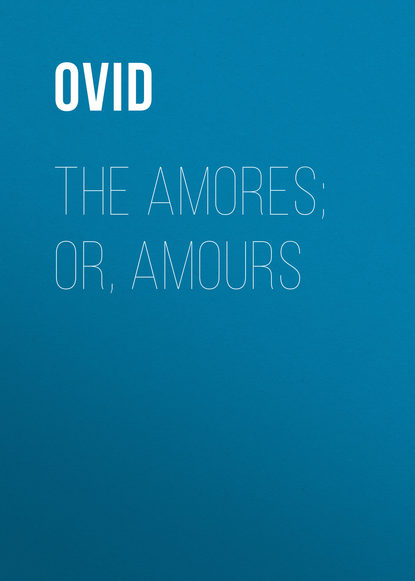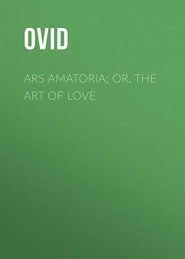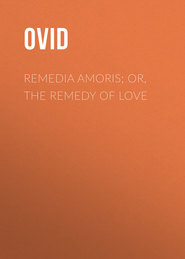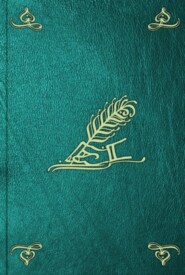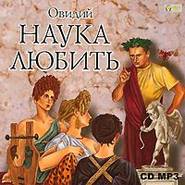По всем вопросам обращайтесь на: info@litportal.ru
(©) 2003-2024.
✖
The Amores; or, Amours
Настройки чтения
Размер шрифта
Высота строк
Поля
Lo! Corinna flies from both the well-known couch, and the Penates of her home, and prepares to go upon the deceitful paths of the ocean. Ah wretched me! why, for you, must I dread the Zephyrs, and the Eastern gales, and the cold Boreas, and the warm wind of the South? There no cities will you admire, there no groves; ever the same is the azure appearance of the perfidious main.
The midst of the ocean has no tiny shells, or tinted pebbles; 405 (#x8_x_8_i225) that is the recreation 406 (#x8_x_8_i228) of the sandy shore. The shore alone, ye fair, should be pressed with your marble feet. Thus far is it safe; the rest of that path is full of hazard. And let others tell you of the warfare of the winds: the waves which Scylla infests, or those which Charybdis haunts: from what rocky range the deadly Ceraunia projects: in what gulf the Syrtes, or in what Malea 407 (#x8_x_8_i231) lies concealed. Of these let others tell: but do you believe what each of them relates: no storm injures the person who credits them.
After a length of time only is the land beheld once more, when, the cable loosened, the curving ship runs out upon the boundless main: where the anxious sailor dreads the stormy winds, and sees death as near him, as he sees the waves. What if Triton arouses the agitated waves? How parts the colour, then, from all your face! Then you may invoke the gracious stars of the fruitful Leda: 409 (#x8_x_8_i234) and may say, 'Happy she, whom her own dry land receives!'Tis far more safe to lie snug in the couch, 410 (#x8_x_8_i237) to read amusing books, 411 (#x8_x_8_i240)and to sound with one's fingers the Thracian lyre.
But if the headlong gales bear away my unavailing words, still may Galatea be propitious to your ship. The loss of such a damsel, both ye Goddesses, daughters of Nereus, and thou, father of the Nereids, would be a reproach to you. Go, mindful of me, on your way, soon to return with favouring breezes: may that, a stronger gale, fill your sails. Then may the mighty Nereus roll the ocean towards this shore: in this direction may the breezes blow: hither may the tide impel the waves. Do you yourself entreat, that the Zephyrs may come full upon your canvass: do you let out the swelling sails with your own hand.
I shall be the first, from the shore, to see the well-known ship, and I shall exclaim, "'Tis she that carries my Divinities: 412 (#x8_x_8_i243) and I will receive you in my arms, and will ravish, indiscriminately, many a kiss; the victim, promised for your return, shall fall; the soft sand shall be heaped, too, in the form of a couch; and some sand-heap shall be as a table 413 (#x8_x_8_i246)for us. There, with wine placed before us, you shall tell many a story, how your bark was nearly overwhelmed in the midst of the waves: and how, while you were hastening to me, you dreaded neither the hours of the dangerous night, nor yet the stormy Southern gales. Though they be fictions, 414 (#x8_x_8_i249)yet all will I believe as truth; why should I not myself encourage what is my own wish? May Lucifer, the most brilliant in the lofty skies, speedily bring me that day, spurring on his steed."
ELEGY XII
Come, triumphant laurels, around my temples; I am victorious: lo! in my bosom Corinna is; she, whom her husband, whom a keeper, whom a door so strong, (so many foes!) were watching, that she might by no stratagem be taken. This victory is deserving of an especial triumph: in which the prize, such as it is, is gained without bloodshed. Not lowly walls, not towns surrounded with diminutive trenches, but a fair damsel has been taken by my contrivance.
When Pergamus fell, conquered in a war of twice five years: 415 (#x8_x_8_i252) out of so many, how great was the share of renown for the son of Atreus? But my glory is undivided, and shared in by no soldier: and no other has the credit of the exploit. Myself the general, myself the troops, I have attained this end of my desires: I, myself, have been the cavalry, I the infantry, I, the standard-bearer too. Fortune, too, has mingled no hazard with my feats. Come hither, then, thou Triumph, gained by exertions entirely my own.
And the cause 416 (#x8_x_8_i255) of my warfare is no new one; had not the daughter of Tyndarus been carried off, there would have been peace between Europe and Asia. A female disgracefully set the wild Lapithæ and the two-formed race in arms, when the wine circulated. A female again, 417 (#x8_x_8_i258) good Latinus, forced the Trojans to engage in ruthless warfare, in thy realms. 'Twas the females, 421 (#x8_x_8_i261) when even now the City was but new, that sent against the Romans their fathers-in-law, and gave them cruel arms. I have beheld the bulls fighting for a snow-white mate: the heifer, herself the spectator, afforded fresh courage. Me, too, with many others, but still without bloodshed, has Cupid ordered to bear the standard in his service.
ELEGY XIII
While Corinna, in her imprudence, is trying to disengage the burden of her pregnant womb, exhausted, she lies prostrate in danger of her life. She, in truth, who incurred so great a risk unknown to me, is worthy of my wrath; but anger falls before apprehension. But yet, by me it was that she conceived; or so I think. That is often as a fact to me, which is possible.
Isis, thou who dost 422 (#x8_x_8_i264) inhabit Parætonium, 423 (#x8_x_8_i267) and the genial fields of Canopus, 424 (#x8_x_8_i270) and Memphis, 425 (#x8_x_8_i273) and palm-bearing Pharos, 426 (#x8_x_8_i276) and where the rapid. Nile, discharged from its vast bed, rushes through its seven channels into the ocean waves; by thy 'sistra' 428 (#x8_x_8_i279) do I entreat thee; by the faces, too, of revered Anubis; 429 (#x8_x_8_i282) and then may the benignant Osiris 430 (#x8_x_8_i285) ever love thy rites, and may the sluggish serpent 431 (#x8_x_8_i288) ever wreath around thy altars, and may the horned Apis 432 (#x8_x_8_i291) walk in the procession as thy attendant; turn hither thy features, 433 (#x8_x_8_i294) and in one have mercy upon two; for to my mistress wilt thou be giving life, she to me. Full many a time in thy honour has she sat on thy appointed days, 434 (#x8_x_8_i297) on which 435 (#x8_x_8_i300) the throng of the Galli 436 (#x8_x_8_i303) wreathe themselves with thy laurels. 437 (#x8_x_8_i306)
Thou, too, who dost have compassion on the females who are in labour, whose latent burden distends their bodies slowly moving; come, propitious Ilithyia, 438 (#x8_x_8_i309) and listen to my prayers. She is worthy for thee to command to become indebted to thee. I, myself, in white array, will offer frankincense at thy smoking altars; I, myself, will offer before thy feet the gifts that I have vowed. I will add this inscription too; "Naso, for the preservation of Corinna, offers these." But if, amid apprehensions so great, I may be allowed to give you advice, let it suffice for you, Corinna, to have struggled in this one combat.
ELEGY XIV
Of what use is it for damsels to live at ease, exempt from war, and not with their bucklers, 439 (#x8_x_8_i312) to have any inclination to follow the bloodstained troops; if, without warfare, they endure wounds from weapons of their own, and arm their imprudent hands for their own destruction? She who was the first to teach how to destroy the tender embryo, was deserving to perish by those arms of her own. That the stomach, forsooth, may be without the reproach of wrinkles, the sand must 440 (#x8_x_8_i315) be lamentably strewed for this struggle of yours.
If the same custom had pleased the matrons of old, through such criminality mankind would have perished; and he would be required, who should again throw stones 441 (#x8_x_8_i318) on the empty earth, for the second time the original of our kind. Who would have destroyed the resources of Priam, if Thetis, the Goddess of the waves, had refused to bear Achilles, her due burden? If Ilia had destroyed 442 (#x8_x_8_i321) the twins in her swelling womb, the founder of the all-ruling City would have perished.
If Venus had laid violent hands on Æneas in her pregnant womb, the earth would have been destitute of its Cæsars. You, too, beauteous one, might have died at the moment you might have been born, if your mother had tried the same experiment which you have done. I, myself, though destined as I am, to die a more pleasing death by love, should have beheld no days, had my mother slain me.
Why do you deprive the loaded vine of its growing grapes? And why pluck the sour apples with relentless hand? When ripe, let them fall of their own accord; once put forth, let them grow. Life is no slight reward for a little waiting. Why pierce 443 (#x8_x_8_i324) your own entrails, by applying instruments, and why give dreadful poisons to the yet unborn? People blame the Colchian damsel, stained with the blood of her sons; and they grieve for Itys, Slaughtered by his own mother. Each mother was cruel; but each, for sad reasons, took vengeance on her husband, by shedding their common blood. Tell me what Tereus, or what Jason excites you to pierce your body with an anxious hand?
This neither the tigers do in their Armenian dens, 444 (#x8_x_8_i327) nor does the lioness dare to destroy an offspring of her own. But, delicate females do this, not, however, with impunity; many a time 445 (#x8_x_8_i330) does she die herself, who kills her offspring in the womb. She dies herself, and, with her loosened hair, is borne upon the bier; and those whoever only catch a sight of her, cry "She deserved it." 446 (#x8_x_8_i333) But let these words vanish in the air of the heavens, and may there be no weight in these presages of mine. Ye forgiving Deities, allow her this once to do wrong with safety to herself; that is enough; let a second transgression bring its own punishment.
ELEGY XV
O ring, 447 (#x8_x_8_i336) about to encircle the finger of the beauteous fair, in which there is nothing of value but the affection of the giver; go as a pleasing gift; and receiving you with joyous feelings, may she at once place you upon her finger. May you serve her as well as she is constant to me; and nicely fitting, may you embrace her finger in your easy circle. Happy ring, by my mistress will you be handled. To my sorrow, I am now envying my own presents.
O! that I could suddenly be changed into my own present, by the arts of her of Ææa, or of the Carpathian old man! 448 (#x8_x_8_i339) Then could I wish you to touch the bosom of my mistress, and for her to place her left hand within her dress. Though light and fitting well, I would escape from her finger; and loosened by some wondrous contrivance, into her bosom would I fall. I too, as well, that I might be able to seal 449 (#x8_x_8_i342) her secret tablets, and that the seal, neither sticky nor dry, might not drag the wax, should first have to touch the lips 450 (#x8_x_8_i345) of the charming fair. Only I would not seal a note, the cause of grief to myself. Should I be given, to be put away in her desk, 459 (#x8_x_8_i348) I would refuse to depart, sticking fast to your fingers with ray contracted circle.
To you, my life, I would never be a cause of disgrace, or a burden which your delicate fingers would refuse to carry. Wear me, when you are bathing your limbs in the tepid stream; and put up with the inconvenience of the water getting beneath the stone. But, I doubt, that on seeing you naked, my passion would be aroused; and that, a ring, I should enact the part of the lover. But why wish for impossibilities? Go, my little gift; let her understand that my constancy is proffered with you.
ELEGY XVI
Sulmo, 460 (#x8_x_8_i351) the third part of the Pelignian land, 461 (#x8_x_8_i354)now receives me; a little spot, but salubrious with its flowing streams. Though the Sun should cleave the earth with his approaching rays, and though the oppressive Constellation 462 (#x8_x_8_i357) of the Dog of Icarus should shine, the Pelignian fields are traversed by flowing streams, and the shooting grass is verdant on the soft ground. The earth is fertile in corn, and much more fruitful in the grape; the thin soil 463 (#x8_x_8_i360) produces, too, the olive, that bears its berries. 464 (#x8_x_8_i363) The rivers also trickling amid the shooting blades, the grassy turfs cover the moistened ground.
But my flame is far away. In one word, I am mistaken; she who excites my flame is far off; my flame is here. I would not choose, could I be placed between Pollux and Castor, to be in a portion of the heavens without yourself. Let them lie with their anxious cares, and let them be pressed with the heavy weight of the earth, who have measured out the earth into lengthened tracks. 465 (#x8_x_8_i366) Or else they should have bid the fair to go as the companions of the youths, if the earth must be measured out into lengthened tracks. Then, had I, shivering, had to pace the stormy Alps, 466 (#x8_x_8_i369) the journey would have been pleasant, so that I had been with my love. With my love, I could venture to rush through the Libyan quicksands, and to spread my sails to be borne along by the fitful Southern gales. Then, I would not dread the monsters which bark beneath the thigh of the virgin Scylla; nor winding Malea, thy bays; nor where Charybdis, sated with ships swallowed up, disgorges them, and sucks up again the water which she has discharged. And if the sway of the winds prevails, and the waves bear away the Deities about to come to our aid; do you throw your snow-white arms around my shoulders; with active body will I support the beauteous burden. The youth who visited Hero, had often swam across the waves; then, too, would he have crossed them, but the way was dark.
But without you, although the fields affording employment with their vines detain me; although the meadows be overflowed by the streams, and though the husbandman invite the obedient stream 467 (#x8_x_8_i372) into channels, and the cool air refresh the foliage of the trees, I should not seem to be among the healthy Peliguians; I should not seem to be in the place of my birth—my paternal fields; but in Scythia, and among the fierce Cilicians, 468 (#x8_x_8_i375) and the Britons painted green, 469 (#x8_x_8_i378) and the rocks which are red with the gore of Prometheus.
The elm loves the vine, 471 (#x8_x_8_i381) the vine forsakes not the elm: why am I so often torn away from my love? But you used to swear, both by myself, and by your eyes, my stars, that you would ever be my companion. The winds and the waves carry away, whither they choose, the empty words of the fair, more worthless than the falling leaves. Still, if there is any affectionate regard in you for me thus deserted: now commence to add deeds to your promises: and forthwith do you, as the nags 472 (#x8_x_8_i384) whirl your little chaise 473 (#x8_x_8_i387) along, shake the reins over their manes at full speed. But you, rugged hills, subside, wherever she shall come; and you paths in the winding vales, be smooth.
ELEGY XVII
If there shall be any one who thinks it inglorious to serve a damsel: in his opinion I shall be convicted of such baseness. Let me be disgraced; if only she, who possesses Paphos, and Cythera, beaten by the waves, torments me with less violence. And would that I had been the prize, too, of some indulgent mistress; since I was destined to be the prize of some fair. Beauty begets pride; through her charms Corinna is disdainful. Ah wretched me! why is she so well known to herself? Pride, forsooth, is caught from the reflection of the mirror: and there she sees not herself, unless she is first adorned.
If your beauty gives you a sway not too great over all things, face born to fascinate my eyes, still, you ought not, on that account, to despise me comparatively with yourself. That which is inferior must be united with what is great. The Nymph Calypso, seized with passion for a mortal, is believed to have detained the hero against his will. It is believed that the ocean-daughter of Nereus was united to the king of Plithia, 474 (#x8_x_8_i390)and that Egeria was to the just Numa: that Venus was to Vulcan: although, his anvil 475 (#x9_x_9_i1) left, he limped with a distorted foot. This same kind of verse is unequal; but still the heroic is becomingly united 476 (#x9_x_9_i4) with the shorter measure.
You, too, my life, receive me upon any terms. May it become you to impose conditions in the midst of your caresses. I will be no disgrace to you, nor one for you to rejoice at my removal. This affection will not be one to be disavowed by you. 477 (#x9_x_9_i7) May my cheerful lines be to you in place of great wealth: even many a fair wishes to gain fame through me. I know of one who publishes it that she is Corinna. 478 (#x9_x_9_i10) What would she not be ready to give to be so? But neither do the cool Eurotas, and the poplar-bearing Padus, far asunder, roll along the same banks; nor shall any one but yourself be celebrated in my poems. You, alone, shall afford subject-matter for my genius.
ELEGY XVIII
While thou art tracing thy poem onwards 479 (#x9_x_9_i13) to the wrath of Achilles, and art giving their first arms to the heroes, after taking the oaths; I, Macer, 480 (#x9_x_9_i16) am reposing in the shade of Venus, unused to toil; and tender Love attacks me, when about to attempt a mighty subject. Many a time have I said to my mistress, "At length, away with you:" and forthwith she has seated herself in my lap. Many a time have I said, "I am ashamed of myself:" when, with difficulty, her tears repressed, she has said, "Ah wretched me! Now you are ashamed to love." And then she has thrown her arms around my neck: and has given me a thousand kisses, which quite overpowered me. I am overcome: and my genius is called away from the arms it has assumed; and I forthwith sing the exploits of my home, and my own warfare.
Still did I wield the sceptre: and by my care my Tragedy grew apace; 481 (#x9_x_9_i19) and for this pursuit I was well prepared. Love smiled both at my tragic pall, and my coloured buskins, and the sceptre wielded so well by a private hand. From this pursuit, too, did the influence of my cruel mistress draw me away, and Love triumphed over the Poet with his buskins. As I am allowed to do, either I teach the art of tender love, (alas! by my own precepts am I myself tormented:) or I write what was delivered to Ulysses in the words of Penelope, or thy tears, deserted Phyllis. What, too, Paris and Macareus, and the ungrateful Jason, and the parent of Hip-polytus, and Hippolytus himself read: and what the wretched Dido says, brandishing the drawn sword, and what the Lesbian mistress of the Æolian lyre.
How swiftly did my friend, Sabinus, return 482 (#x9_x_9_i22) from all quarters of the world, and bring back letters 483 (#x9_x_9_i25) from different spots! The fair Penelope recognized the seal of Ulysses: the stepmother read what was written by her own Hippolytus. Then did the dutiful Æneas write an answer to the afflicted Elissa; and Phyllis, if she only survives, has something to read. The sad letter came to Hypsipyle from Jason: the Lesbian damsel, beloved by Apollo, may give the lyre that she has vowed to Phoebus. 484 (#x9_x_9_i28) Nor, Macer, so far as it is safe for a poet who sings of wars, is beauteous Love unsung of by thee, in the midst of warfare. Both Paris is there, and the adultress, the far-famed cause of guilt: and Laodamia, who attends her husband in death. If well I know thee; thou singest not of wars with greater pleasure than these; and from thy own camp thou comest back to mine.
ELEGY XIX
If, fool, thou dost not need the fair to be well watched; still have her watched for my sake: that I may be pleased with her the more. What one may have is worthless; what one may not have, gives the more edge to the desires. If a man falls in love with that which another permits him to love, he is a man without feeling. Let us that love, both hope and fear in equal degree; and let an occasional repulse make room for our desires.
Why should I think of Fortune, should she never care to deceive me? I value nothing that does not sometimes cause me pain. The clever Corinna saw this failing in me; and she cunningly found out the means by which I might be enthralled. Oh, how many a time, feigning a pain in her head 485 (#x9_x_9_i31) that was quite well, has she ordered me, as I lingered with tardy foot, to take my departure! Oh, how many a time has she feigned a fault, and guilty herself, has made there to be an appearance of innocence, just as she pleased! When thus she had tormented me and had rekindled the languid flame, again was she kind and obliging to my wishes. What caresses, what delightful words did she have ready for me! What kisses, ye great Gods, and how many, used she to give me!
You, too, who have so lately ravished my eyes, often stand in dread of treachery, often, when entreated, refuse; and let me, lying prostrate on the threshold before your door-posts, endure the prolonged cold throughout the frosty night. Thus is my love made lasting, and it grows up in lengthened experience; this is for my advantage, this forms food for my affection. A surfeit of love, 486 (#x9_x_9_i34) and facilities too great, become a cause of weariness to me, just as sweet food cloys the appetite. If the brazen tower had never enclosed Danaë, 487 (#x9_x_9_i37) Danaë had never been made a mother by Jove. While Juno is watching Io 'with her curving horns, she becomes still more pleasing to Jove than she has been before.
Whoever desires what he may have, and what is easily obtained, let him pluck leaves from the trees, and take water from the ample stream. If any damsel wishes long to hold her sway, let her play with her lover. Alas! that I, myself, am tormented through my own advice. Let constant indulgence be the lot of whom it may, it does injury to me: that which pursues, from it I fly; that which flies, I ever pursue. But do thou, too sure of the beauteous fair, begin now at nightfall to close thy house. Begin to enquire who it is that so often stealthily paces thy threshold? Why, too, the dogs bark 488 (#x9_x_9_i40) in the silent night. Whither the careful handmaid is carrying, or whence bringing back, the tablets? Why so oft she lies in her couch apart? Let this anxiety sometimes gnaw into thy very marrow; and give some scope and some opportunity for my stratagems.
If one could fall in love with the wife of a fool, that man could rob the barren sea-shore of its sand. And now I give thee notice; unless thou begin to watch this fair, she shall begin to cease to be a flame of mine. I have put up with much, and that for a long time; I have often hoped that it would come to pass, that I should adroitly deceive thee, when thou hadst watched her well. Thou art careless, and dost endure what should be endured by no husband; but an end there shall be of an amour that is allowed to me. And shall I then, to my sorrow, forsooth, never be forbidden admission? Will it ever be night for me, with no one for an avenger? Am I to dread nothing? Shall I heave no sighs in my sleep? What have I to do with one so easy, what with such a pander of a husband? By thy own faultiness thou dost mar my joys. Why, then, dost thou not choose some one else, for so great long-suffering to please? If it pleases thee for me to be thy rival, forbid me to be so.–
BOOK THE THIRD
ELEGY I
There stands an ancient grove, and one uncut for many a year; 'tis worthy of belief that a Deity inhabits that spot. In the midst there is a holy spring, and a grotto arched with pumice; and on every side the birds pour forth their sweet complaints. Here, as I was walking, protected by the shade of the trees, I was considering upon what work my Muse should commence. Elegy came up, having her perfumed hair wreathed; and, if I mistake not, one of her feet was longer than the other. 501 (#x9_x_9_i45) Her figure was beauteous; her robe of the humblest texture, her garb that of one in love; the fault of her foot was one cause of her gracefulness.
Ruthless Tragedy, too, came with her mighty stride; on her scowling brow were her locks; her pall swept the ground. Her left hand held aloft the royal sceptre; the Lydian buskin 502 (#x9_x_9_i48) was the high sandal for her feet. And first she spoke; "And when will there be an end of thy loving? O Poet, so slow at thy subject matter! Drunken revels 503 (#x9_x_9_i51) tell of thy wanton course of life; the cross roads, as they divide in their many ways, tell of it. Many a time does a person point with his finger at the Poet as he goes along, and say, 'That, that is the man whom cruel Love torments.' Thou art talked of as the story of the whole City, and yet thou dost not perceive it; while, all shame laid aside, thou art boasting of thy feats. 'Twere time to be influenced, touched by a more mighty inspiration; 505 (#x9_x_9_i54) long enough hast thou delayed; commence a greater task. By thy subject thou dost cramp thy genius; sing of the exploits of heroes; then thou wilt say, 'This is the field that is worthy of my genius.' Thy Muse has sportively indited what the charming fair may sing; and thy early youth has been passed amidst its own numbers. Now may I, Roman Tragedy, gain a celebrity by thy means; thy conceptions will satisfy my requirements."
Thus far did she speak; and, supported on her tinted buskins, three or four times she shook her head with its flowing locks. The other one, if rightly I remember, smiled with eyes askance. Am I mistaken, or was there a branch of myrtle in her right hand? "Why, haughty Tragedy," said she, "dost thou attack me with high-sounding words? And canst thou never be other than severe? Still, thou thyself hast deigned to be excited in unequal numbers! 506 (#x9_x_9_i57) Against me hast thou strived, making use of my own verse. I should not compare heroic measures with my own; thy palaces quite overwhelm my humble abodes. I am a trifler; and with myself, Cupid, my care, is a trifler too; I am no more substantial myself than is my subject-matter. Without myself, the mother of wanton Love were coy; of that Goddess do I show myself the patroness 507 (#x9_x_9_i60) and the confidant. The door which thou with thy rigid buskin canst not unlock, the same is open to my caressing words. And yet I have deserved more power than thou, by putting up with many a thing that would not have been endured by thy haughtiness.
"Through me Corinna learned how, deceiving her keeper, to shake the constancy of the fastened door, 508 (#x9_x_9_i63) and to slip away from her couch, clad in a loose tunic, 509 (#x9_x_9_i66) and in the night to move her feet without a stumble. Or how often, cut in the wood, 510 (#x9_x_9_i69) have I been hanging up at her obdurate doors, not fearing to be read by the people as they passed! I remember besides, how, when sent, I have been concealed in the bosom of the handmaid, until the strict keeper had taken his departure. Still further—when thou didst send me as a present on her birthday 511 (#x9_x_9_i72) —but she tore me to pieces, and barbarously threw me in the water close by. I was the first to cause the prospering germs of thy genius to shoot; it has, as my gift, that for which she is now asking thee."
They had now ceased; on which I began: "By your own selves, I conjure you both; let my words, as I tremble, be received by unprejudiced ears. Thou, the one, dost grace me with the sceptre and the lofty buskin; already, even by thy contact with my lips, have I spoken in mighty accents. Thou, the other, dost offer a lasting fame to my loves; be propitious, then, and with the long lines unite the short.
"Do, Tragedy, grant a little respite to the Poet. Thou art an everlasting task; the time which she demands is but short." Moved by my entreaties, she gave me leave; let tender Love be sketched with hurried hand, while still there is time; from behind 514 (#x9_x_9_i75) a more weighty undertaking presses on.





